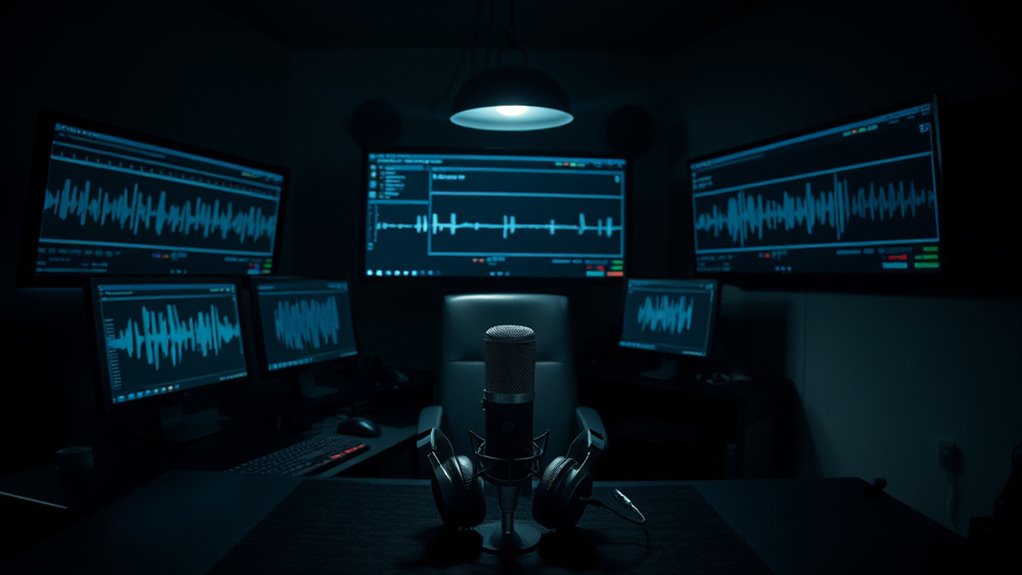Voice cloning is a growing threat in deception, with scammers using advanced technology to imitate voices convincingly. U.S. losses surged to $2.7 billion in 2023 due to these scams, often exploiting emotional connections through impersonation. Techniques range from grandparent scams to corporate fraud. As voice synthesis capabilities expand, the risks increase, leading to urgent calls for regulation and ethical standards. To keep yourself informed on this critical issue, there's more to uncover about its implications.
Key Takeaways
- Voice cloning technology enables impersonation, making it a tool for espionage and deception by mimicking voices of key individuals.
- Cloned voices can facilitate unauthorized access to sensitive information, posing significant security risks in corporate and governmental environments.
- Scammers utilize cloned voices in schemes like fake kidnappings, exploiting emotional ties and trust to manipulate victims.
- The lack of robust regulations increases the potential for voice cloning misuse in espionage and other malicious activities.
- Detection technologies are under development to differentiate between human and synthetic voices, aiming to mitigate the risks of voice cloning in espionage.
Understanding Voice Cloning Technology

As you dive into the world of voice cloning technology, you'll discover it's all about creating synthetic voices that closely mimic human speech patterns. This innovative tech finds applications across various industries, from entertainment to customer service and gaming. However, it also brings ethical concerns, especially regarding consent and privacy. The potential for misuse is significant; voice cloning can facilitate malicious activities like identity theft and spear-phishing attacks. Recent advancements have made this technology more sophisticated and accessible, heightening both its utility and risks. Generative Adversarial Networks play a crucial role in the development of voice cloning, enabling the creation of realistic and authentic-sounding voices. As you explore further, you'll see how crucial it's to navigate the balance between leveraging voice cloning's benefits and addressing the ethical and security challenges it poses.
The Mechanics of Voice Cloning
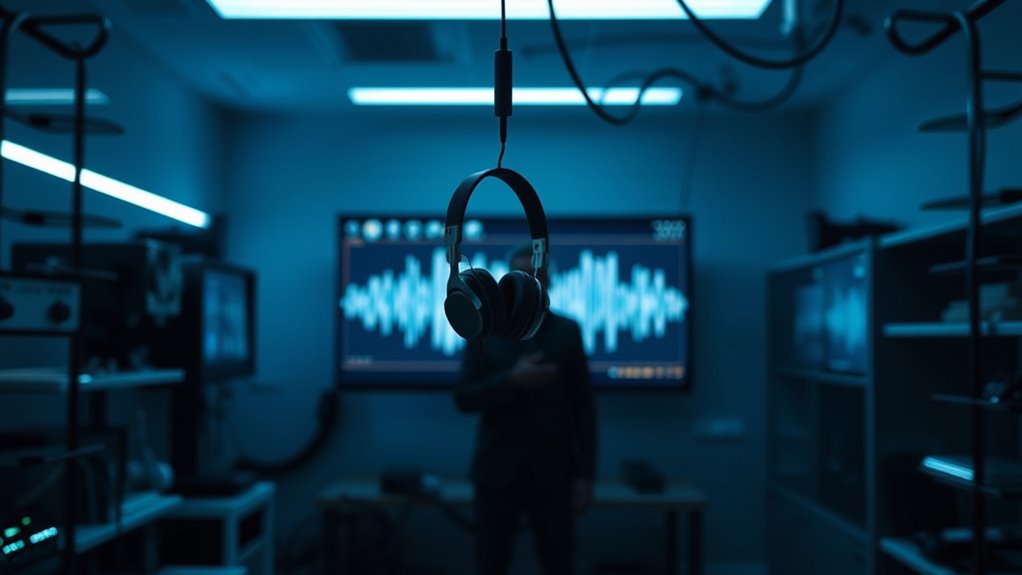
Understanding the mechanics of voice cloning reveals a fascinating interplay of technology and artistry.
You start by collecting voice samples, ensuring they cover various speech patterns and accents. High-quality recordings are vital; aim for .mp3 or .wav formats with minimal background noise. For accurate cloning, you might need anywhere from 3 minutes to 2 hours of audio, though recent advancements allow for cloning from just 5 seconds. Notably, new models like Hume AIs OCTAVE can clone voices from brief recordings, showcasing the rapid evolution in this field.
Next, neural networks analyze these samples, identifying unique speech traits. Generative Adversarial Networks refine the synthetic voices, while deep learning models handle the sequential data of speech.
The process involves cleaning audio, extracting features, and training models to generate realistic speech that mimics the original voice. Continuous refinement enhances the quality of the output.
The Impacts of Voice Cloning Scams

Voice cloning scams have emerged as a significant threat, impacting both personal and financial security in alarming ways.
In 2023 alone, the U.S. lost $2.7 billion to imposter scams, with a significant portion attributed to voice cloning. Scammers often impersonate family members, demanding ransom and exploiting emotional vulnerabilities, which can leave you feeling anxious and fearful. The lack of safeguards in the voice cloning industry further exacerbates these risks, allowing scammers to replicate voices without consent. During this time, the need for strong encryption standards has never been more critical to protect sensitive information.
The ease of cloning voices, combined with the lack of regulatory safeguards, makes these scams increasingly sophisticated. You might find it hard to trust relationships as repeated scams erode your confidence in others.
To protect yourself, consider using secret safe words with family and limit your social media presence, ensuring you stay one step ahead of potential threats.
Notable Instances of Voice Cloning Abuse

The rise of voice cloning scams has paved the way for alarming instances of abuse that exploit technology for malicious ends.
You might've heard of grandparent scams, where fraudsters impersonate grandchildren in distress to extract money from unsuspecting seniors. Journalists have even showcased how cloned voices can access bank accounts, exposing serious security flaws. With the advent of AI voice cloning technology, these scams have become easier and more convincing for perpetrators.
Fraudsters exploit voice cloning in grandparent scams, impersonating distressed relatives to swindle vulnerable seniors out of their money.
In more sinister cases, cloned voices have been utilized in fake kidnapping schemes, extorting families for ransom. Corporate settings aren't immune either; impersonating executives can lead to unauthorized transactions.
Moreover, political disinformation through AI-generated voice messages threatens to manipulate public opinion and influence elections. These examples highlight the urgent need to recognize and combat the misuse of voice cloning technology.
Safeguarding Against Voice Cloning Threats

As technology advances, protecting yourself from voice cloning threats becomes increasingly crucial. AI can clone voices using just a few seconds of audio, making it a powerful tool for scammers. To safeguard against these risks, limit your voice data sharing online and consider using automated voicemail to prevent voice sample capture. Switching to an automated message is a simple yet effective measure to reduce the risk of voice capture. Establish a family safe word for verifying identities during emergencies, and avoid voice biometric verification in favor of facial recognition.
Always verify requests through alternative channels before acting on them. Trust your instincts; if a call feels suspicious, hang up and verify.
Report any suspicious calls to carriers or authorities, and consider utilizing AI detection tools to spot synthetic voices in real-time.
The Future Landscape of Voice Cloning
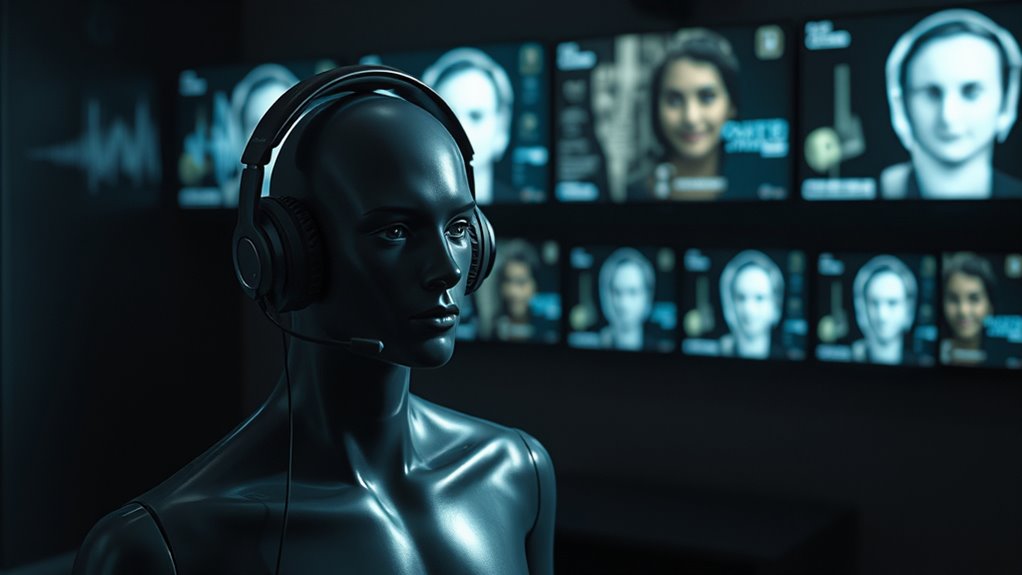
While advancements in voice cloning technology continue to reshape various industries, its implications reach far beyond mere innovation. You'll see tools like VALL-E generating personalized speech from just a three-second audio sample, while DINO-VITS synthesizes expressive voices that convey emotions. OpenVoice allows for multilingual speech generation, enhancing global communication. As these technologies evolve, you can expect significant applications in entertainment, accessibility for those with speech impairments, and personalized advertising. Additionally, enhanced accessibility will ensure that individuals with disabilities can communicate more effectively, making voice technology a crucial part of modern life. Real-time analytics capabilities will revolutionize customer service, making it feel more human. The voice cloning market is booming, with a projected growth rate of 25.2% by 2030, indicating a future where realistic, AI-generated voices become integral to your daily experiences. Embrace this exciting frontier!
Challenges in Regulating Voice Cloning

Regulating voice cloning presents a complex challenge, given that existing legal frameworks often fall short in addressing the unique issues it raises. Current copyright laws don't classify voices as intellectual property, leaving gaps in protection. Privacy concerns also loom large, as cloning often involves processing biometric data without consent. You could find yourself caught in a web of defamation laws, where determining liability becomes tricky. With varied federal and state laws, you may face inconsistent legal standards. Additionally, enforcing regulations requires collaboration among industry players and government agencies. Without robust safeguards, there's a risk of scams and misuse. As technology evolves, regulatory frameworks must adapt swiftly to address these pressing concerns, especially as voice cloning technology raises alarms among technology experts regarding its potential for fraud and misinformation.
Ethical Considerations in Voice Cloning
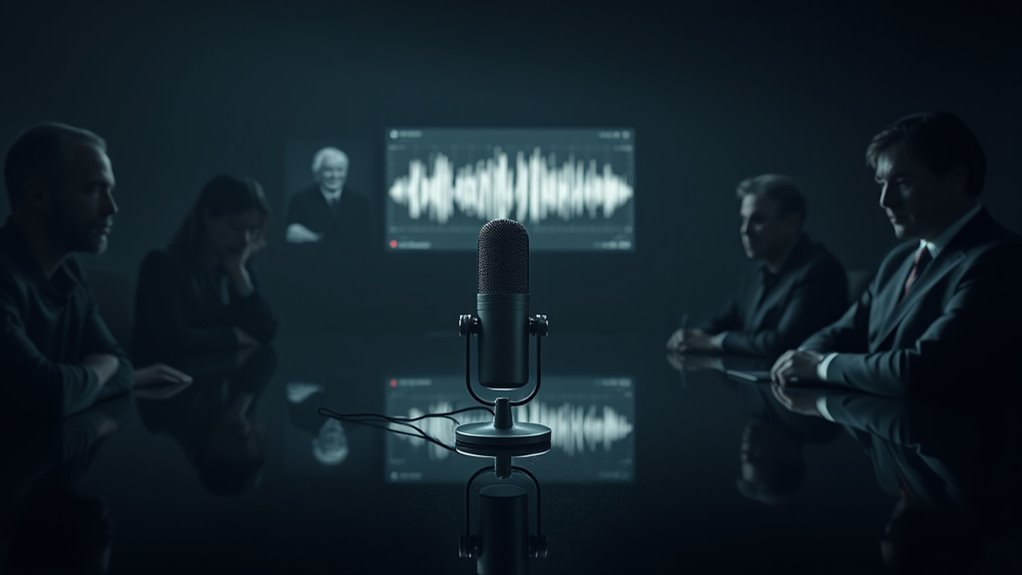
Given the rapid advancements in voice cloning technology, ethical considerations have become increasingly vital in navigating its implications. You must prioritize transparency, ensuring that companies disclose when synthetic voices are used and for what purposes. Obtaining explicit consent from individuals whose voices are cloned is crucial to maintain their autonomy. Protecting voice data with strong security measures, like encryption and access controls, can't be overlooked. Moreover, the expected growth of voice-assisted devices to exceed 8 billion by 2023 highlights the urgent need for ethical oversight. Regular audits should enforce compliance with ethical standards and regulations. Additionally, developing ethical AI guidelines that emphasize fairness and accountability is essential. As voice cloning evolves, balancing innovation with ethical responsibility will be key to preventing misuse and protecting privacy, ultimately fostering trust in this transformative technology. Furthermore, the importance of ethical guidelines in AI can help mitigate potential biases that may arise from misuse of voice cloning technologies.
Global Efforts to Combat Voice Cloning Scams
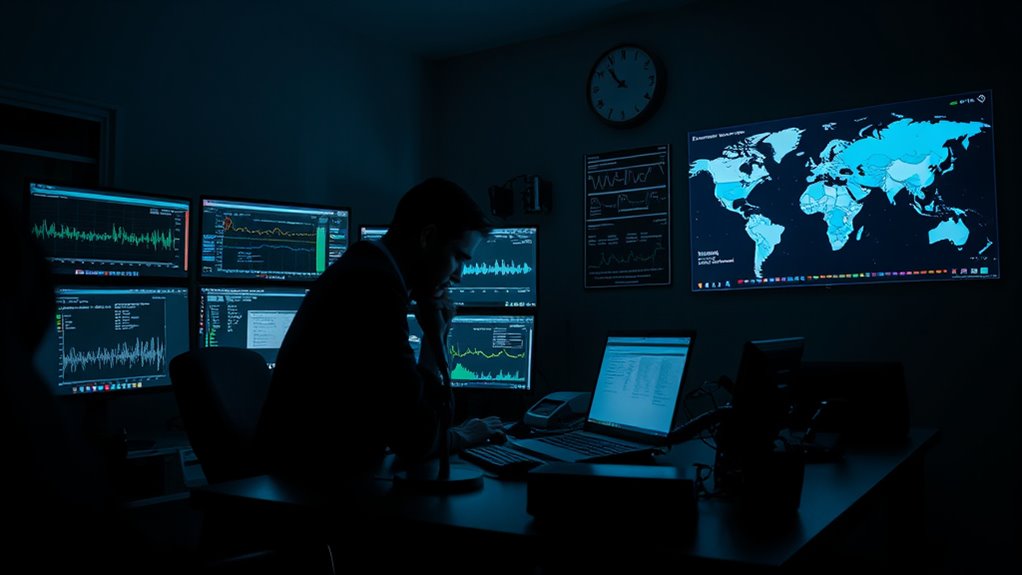
As the threat of voice cloning scams escalates, global efforts to combat this issue are gaining momentum. The FTC has initiated the Voice Cloning Challenge, encouraging innovative solutions to tackle these scams. They're also considering a new Impersonation Rule to deter deceptive practices. On the tech front, AI algorithms are being developed to distinguish between human and synthetic voices, while real-time detection technologies can spot cloned voices during calls. Public awareness campaigns are essential, warning consumers to verify identities before responding to suspicious messages. The majority of voice cloning AI products lack meaningful safeguards, highlighting the need for enhanced consumer protections. International collaboration is crucial, as these scams affect multiple countries. With financial losses hitting billions, the urgency for robust countermeasures against voice cloning scams has never been more critical.
Frequently Asked Questions
How Can I Detect if a Voice Has Been Cloned?
To detect if a voice has been cloned, start by analyzing the audio for irregularities in tone and rhythm.
Use tools that apply machine learning techniques to assess features like frequency patterns and timing inconsistencies. Listening closely for subtle discrepancies can also help.
Consider employing real-time detection algorithms that assign a "liveness score" to the audio. If you suspect cloning, compare the voice to known authentic samples for confirmation.
Are There Legal Consequences for Using Voice Cloning Maliciously?
Yes, there are legal consequences for using voice cloning maliciously.
If you clone someone's voice without permission and use it for fraud or identity theft, you could face serious charges.
Additionally, unauthorized commercial use may lead to lawsuits under defamation or right of publicity laws.
States have varying laws, so the specific legal repercussions depend on where you are.
Always consider the ethical implications to avoid potential legal trouble.
Can Voice Cloning Technology Be Used for Positive Purposes?
Absolutely, you can use voice cloning technology for a range of positive purposes.
It enhances media and entertainment by recreating voices for dubbing and narration. In customer service, it personalizes interactions through virtual assistants.
For those with speech impairments, it provides synthetic voices, preserving their vocal identity.
Additionally, voice cloning enriches gaming and virtual reality experiences, making characters more engaging.
What Are the Signs of a Voice Cloning Scam?
When you encounter a potential voice cloning scam, watch for emotional appeals that seem overly manipulative.
Pay attention to the sound quality; if it's off, that's a red flag.
Be wary of far-fetched stories and unusual speech patterns.
If someone pressures you for urgent financial help or asks for secrecy, take a step back.
Always verify the caller's identity before taking action, especially if it feels rushed or suspicious.
How Does Voice Cloning Affect Personal Privacy?
"Curiosity killed the cat, but voice cloning might just kill your privacy."
When someone uses voice cloning technology, they can easily invade your personal space without your consent. This unauthorized collection of your unique voice data raises significant privacy concerns.
You're at risk of identity theft and manipulation, especially since many companies don't provide transparency about how they handle your voice.
It's crucial to stay informed and advocate for stronger data protection measures.
Conclusion
As you navigate the murky waters of voice cloning, remember that awareness is your best defense. Just like a chameleon blending into its surroundings, voice cloning technology adapts and evolves, making it crucial for you to stay informed. By understanding its mechanics and recognizing potential scams, you can safeguard yourself against deception. The future may be uncertain, but with vigilance and ethical considerations, you can help shape a landscape where technology enhances life rather than threatens it.
